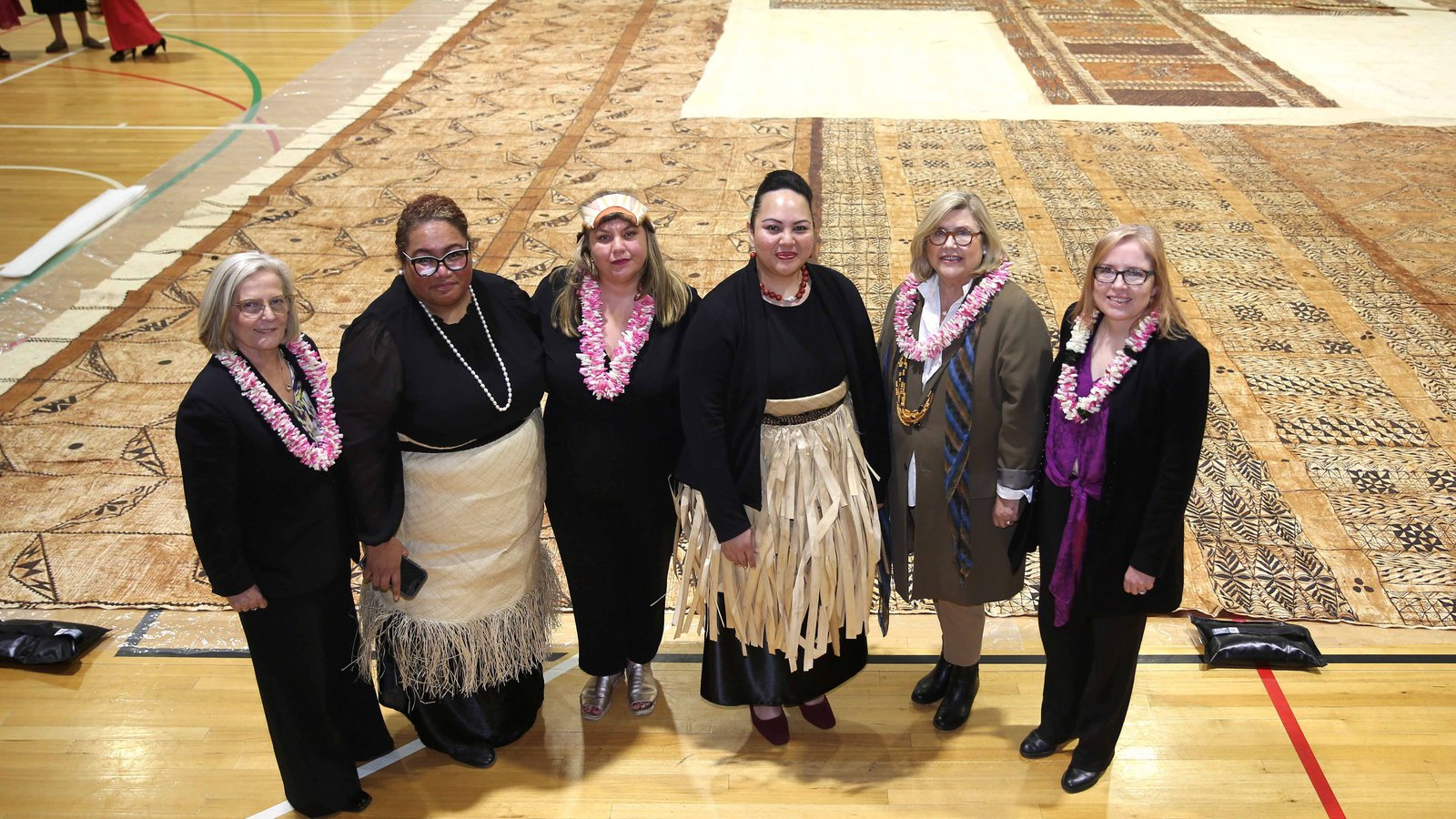News bites
Delve into engaging Museum news, featuring captivating stories spanning culture to science.


Unrolling the sacred Ngatu Me’a’ofa
In June, one of the world’s largest Tapa bark cloths, Ngatu Me’a’ofa (Gifted Tapa / Bark Cloth), was unveiled in full for the first time in almost 50 years.
The Ngatu Me’a’ofa was a gift from the people of Tonga to the Sydney Opera House Trust for its opening by Queen Elizabeth 11 in 1973. Due to its fragility and size (29 metres x 15 metres), it was subsequently gifted to the Australian Museum, where it has remained in climate-controlled storage and has not been seen in its entirety in five decades. It is one of the largest objects in the AM’s collection and one of the largest Tapa bark cloths in the world.
The Tapa cloth holds special cultural significance to the people of Tonga. Considered a ‘fabric of life’, it is made from the paper mulberry tree (Broussonetia papyrifera) and is central to their society, culture and spirituality.

New Books
Two AM staffers released books this year, which the AM is proud to celebrate. Dr Stephen Jackson — who has previously worked as a field ecologist, zookeeper, curator, government regulator, author, part-time lecturer and wildlife consultant — typically focuses on the ecology, conservation and taxonomy of mammals. He has turned his research into more than 70 refereed papers and book chapters and has published six books, the latest of which is Australian Mammals: Biology and Captive Management.

Australia’s coral reefs are unique, ancient and continue to fascinate tourists, scientists, conservationists and many alike. But Australian naturalists have only just begun to unravel the origins, diversity and challenges facing the long-term survival of our reefs. A recently published book edited by the AM's Dr Pat Hutchings – Senior Fellow, Marine Invertebrates – along with Dr Sarah Hamylton and Professor Ove Hoegh-Guldberg, explores our evolving relationship with reefs and highlights what you need to know about Australian coral reefs. Coral Reefs of Australia: Perspectives from beyond the Water’s Edge includes essays by 91 contributors and authors, arranged in eight chapters bringing together the diverse views of First Nations peoples, geologists, biologists, managers, artists, historians, and conservationists.

Lord Howe Island, the cover image for Coral Reefs of Australia: Perspectives from beyond the Water’s Edge.
Image: Matt Curnock © Matt CurnockLearn more about Mammalogy
Mammalogy is the study of mammals, which are warm-blooded vertebrate animals that suckle their young on milk. Dr Sandy Ingleby, Collection Manager of Mammals at the Australian Museum, discusses the study of mammals and the Museum's extensive collection in the video below.
Sustainability & Climate Action Plan
The AM is committed to transforming the conversation about climate change, the environment and wildlife conservation; being a strong advocate for First Nations’ culture; and developing world-leading science, collections, exhibitions and education programs.
The Corporate Strategic Plan 2020-2023 sets out key actions relative to sustainability and climate action:
- Establishing a dedicated Climate Solutions Centre
- Conducting research into dynamics between people, climate and nature
- Translating this research into high-quality outreach including exhibitions, public education programs and education resources
- Leading by example on sustainability.
The Sustainability & Climate Action Plan 2023-2025 complements this work and provides a roadmap to deliver the following:
- Reduce operational impacts including energy and emissions, transport, waste and resources, water and procurement
- Future-proof the Museum
- Empower our people through roles and processes
- Engage stakeholders by telling the AM’s story and partnering for change and public outreach
- Lead for climate action through sharing solutions and empowering action.
See the full action plan here.
Reconciliation Action Plan
Our commitment to genuine collaboration to amplify First Nations voices has only just begun and our new Innovate Reconciliation Action Plan (RAP) sets out a series of actions to build on this solid ground and build a more reconciled Australia for everyone.
This RAP sets out clear actions and deliverables across the organisation focusing on three focus areas:
- Relationships: Increased engagement, consultation and repatriation
- Respect: Truth-telling and education
- Opportunities: Economic participation and self-determination.
Inclusion and Access Action Plan
The AM continues to embed the principles of social inclusion and equity throughout its exhibitions, programs, services and venues. These include, but are not limited to:
- Ramps and lifts
- Automatic doors
- Guide dogs and companion dogs are welcome
- Early Birds Access Mornings provide a reduced-sensory, relaxed and supportive environment.
The AM proudly supports the Hidden Disability Sunflower Lanyard Scheme. People with hidden disabilities can choose to wear a Sunflower lanyard, which discreetly indicates to staff that they may need additional time, support, or understanding.
See the full action plan here.








